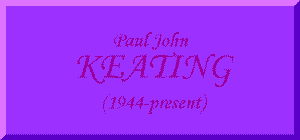|
        |
As treasurer for eight years Keating implemented the most far-reaching economic reforms in Australia's postwar history with progressive deregulation of the financial sector and float of the dollar. After winning an historic fifth-term victory for the Labor Party in 1993, Keating pursued his micro-economic reform agenda, committing himself to high productivity growth, greater efficiency in transport industries and improving Australia's international competitiveness. As a passionate advocate of an Australian cultural identity, Keating rekindled the republican debate and launched a far-reaching arts industry program entitled "Creative Nation." Paul Keating was born in Sydney on January 18, 1944. He left school at 14, studied for his Higher School Certificate at night, managed rock band the Ramrods, and worked for a Hong Kong trading company and with the Electricity Commission of New South Wales. Interested in politics from an early age, he joined the Labor Party when he was 15 and in 1966 became president of the New South Wales Youth Council (now called Young Labor). Elected to the seat of Blaxland at age 25, he was appointed Minister for Northern Australia in the Whitlam Cabinet two months before the dramatic November 1975 sacking of Gough Whitlam. He married Anna Johanna Maria von Iersel (Annita) in 1975. They have four children, joining the ranks of Joseph Lyons and William McMahon as prime ministers with young children. In the Labor opposition Ministry from 1976 to 1983 Keating served as shadow Minister for Agriculture, Minerals and Energy, Resources and Energy and finally as treasurer. When the Labor Party regained government in March 1983 he became treasurer, the post in which he won recognition for his far-reaching economic reforms. In his eight years as treasurer Keating delivered 14 major economic statements. Among the most significant of these reforms were the progressive deregulation of the financial sector, removing interest rate ceilings, the float of the Australian dollar (December 1983), entry of foreign banks and extensive changes to the taxation system. In 1984 Keating was named "Finance Minister of the Year" by the financial/economic journal Euromoney for his achievement of a budget surplus and his far-sighted economic strategies. The 1985 budget saw a growing deficit. Keating described the budget as being based "on the two great goals of economic growth and a fairer society." By the beginning of 1986 the Australian dollar had lost parity by 30 per cent against the American dollar, and there were even more drastic drops against other currencies, notably against the Japanese yen and the Deutschmark. With falling commodity prices farmers staged angry rallies outside Parliament House. Interest rates soared to over 20 per cent. In spite of the lower value of the dollar, many areas of the manufacturing sector were not competitive with more technologically advanced industries in Asia, especially South Korea and Taiwan. Imports continued to rise. By 1986 foreign debt was higher than anticipated. Treasurer Keating warned that if Australia did not "get manufacturing going again and keep moderate wage outcomes and a sensible economic policy, it would end up being a third-rate economy . . . a banana republic." The boom was about to bust. The credit explosion that accompanied deregulation could not be sustained. The world recession deepened and with it, "the recession that Australia had to have." Labor was re-elected for an historic fourth term in 1990. When Keating first challenged Bob Hawke for the leadership in June 1991 he did not have the numbers in Caucus and resigned as treasurer. The next time he challenged Hawke, in December 1991, he was successful. In March 1993 Keating led the Labor Party to an historic fifth term in power. As prime minister he pursued his economic reform agenda, including deregulation of the airline and telecommunications industries. "Investing in the Nation," a white paper on developing Australia's infrastructure, promised a national standard-gauge rail highway and the establishment of a National Electricity Grid Corporation. Achievement in other areas included the introduction of legislation to ensure the protection of endangered species, a major review of the Sex Discrimination Act, the revision of the classification of TV violence, plus plans for an international conference on children's television and the adoption of recommendations of the Royal Commission into Aboriginal Deaths in Custody. Keating also showed a commitment to women's issues with policies to provide family financial assistance and childcare aid. The Aboriginal Land Fund and Native Title Act consolidated Keating's support of the High Court decision on Mabo. Pledging to reduce unemployment in May 1994, Keating launched a $6.5 billion plan, "Working Nation," designed to halve the unemployment rate by the end of the decade. Keating believed strongly in an independent Australian identity. He continued the trend of turning Australia's focus away from traditional Western ties and towards Asia, its nearest neighbours and the fastest-growing region in the world. Allied with Keating's focus on a new cultural shift was the debate on republicanism and strong support for the arts, demonstrated by the "Creative Nation" statement of October 1994. In the March 1996 elections, the Keating government was resoundingly defeated by the Liberal/National Coalition under John Howard. Opinion polls cited the main reasons as a perception by voters that the Labor Party had been in power for too long and had lost touch with the electorate, as well as financial concerns about the size of the national account deficit. The polls showed that approval of Keating as prime minister, as opposed to support for the Labor Party, had remained relatively high. Keating resigned as Labor leader, and from parliament, soon after the election. Copyright unknown
|
|
|
|
[ Virtual
Australia | The
World We Live In | The
Things We Do ]
Problems/Broken Links can be reported
to
All text and
graphics unless otherwise stated are ©1998-2000 Kim Holden, Virtual Australia.
|

![[Visit Oska]](../../images/oska003.gif)
